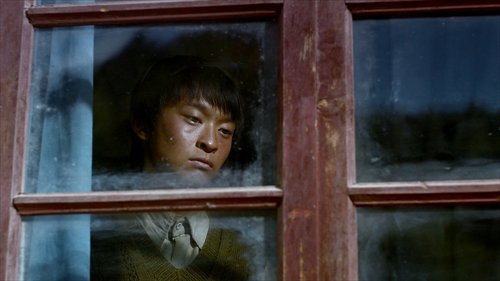Tibet-centric ‘De Lan’ wins big at the Shanghai Film Festival

Promotional material for Golden Goblet winner De Lan Photo: Courtesy of Mtime
The 19th Shanghai International Film Festival (SIFF), which came to an end on Sunday, served as a window on China's film market and cinematic culture. SIFF this year provided the most lavish menu of films in its history, with 1,360 screening of 600 films held at 45 cinemas in districts throughout the city. Finally box office totals for these films reached 20 million yuan ($3.04 million), an 11 percent increase over last year.
Fourteen films were selected from 2,403 candidates from 114 countries and regions to compete for the Golden Goblet Awards this year.
Of the three films from China, two were set in Tibet. De Lan, a film directed by Liu Jie, won Best Film. Set in the 1980s, the story revolves around a young Han Chinese loan officer named Xiaowang who meets a Tibetan girl named De Lan. Being led to a Tibetan village, Xiaowang experiences culture shock from having to adapt to life there. The Golden Goblet Awards gave the film high marks, saying that, "It is a simple but intriguing film, in which life generates miraculous confrontations that provide emotional resonance to the entire story."
Additionally, Chinese actor Liu Ye won Best Actor for Cock and Bull and Japanese actress Naomi Fujiyama won Best Actress for Danchi. The Jury Prize went to See you in Texas by Italian director Vito Palmieri, while Finnish director Antti Jokinen was awarded Best Director for Flowers of Evil.
Indian film THITHI won Best Film and Best Scriptwriter at the Asian New Talent Awards at SIFF. In recent years, the Asian New Talent Awards have established partnerships with other international film festivals, such as the Tokyo International Film Festival, to guarantee award-winning works in Shanghai can directly enter competition at these festivals.
Encouraging new film talents
This year, SIFF extended its reach to collaborate with the Tallinn Black Nights Film Festival in Estonia, the Mumbai International Film Festival, the Venice International Film Festival and the Toronto International Film Festival to promote young Asian filmmakers to a global audience.
In addition to the Asian New Talents Awards, the SIFF Project has also been encouraging young talent by inviting experts to review their film proposals at SIFF over the past 10 years. This year, the SIFF Project chose 30 proposals out of 350 applicants from 10 countries, and expanded the number of award winners for the project from two to three. Meanwhile more film companies took part in this section by offering cash prizes to outstanding proposals.
A number of prestigious filmmakers also took part in cultivating new film talents. Recently, award-winning director Jia Zhangke confirmed that he would become the dean of the Shanghai Vancouver Film School, which was established two years ago during the 17th SIFF. Additionally, Hong Kong martial arts star Sammo Hung opened his own film studio in Shanghai at the invitation of SIFF.
International outreach
SIFF's international profile continues to rise every year. This year was no exception as the festival offered a stellar list of big names from the global film scene who attended hundreds of events. Director Ang Lee caused a stir among Chinese filmmakers and film audiences with his suggestion that Chinese filmmakers should not be driven by the box office; while Sir Ian McKellen, Emir Kusturica and Krzysztof Piesiewicz not only brought classic film works, but also their insight on cultivating cinematic culture.
Additionally, SIFF facilitated cultural exchange between countries involved in China's "One Belt, One Road" initiative through contracts that will introduce more Chinese films to these countries and vice versa. Meanwhile, a good selection of films made in these "One Belt, One Road" countries such as Iran, Poland, Czech Republic, Israel, India and the Philippines were screened during SIFF. Over at the SIFF Market, a section for film trading, a new area was specially established for films made in "One Belt, One Road" countries.
Looking into the future
Amid the busy film screenings and market, SIFF this year made a pioneering move to examine the Chinese film market through a series of forums that took on those issues that were set to influence the future of Chinese film.
The use of VR technology in cinemas was discussed by major Chinese cinema owners.
Zeng Maojun, CEO of Wanda Cinemas, predicted that the use of VR in cinemas will be limited to short experiences rather than be used to watch feature films.
The destiny of art house films also received a lot of attention.
This discussion was kicked off earlier this year when a film producer posted on social media a video in which he got on his knees and begged people to push for more screenings of late director Wu Tianming's art film.
On Wednesday, Li Jun and Yang Cheng, two veteran art film promoters, announced the establishment of a new company dedicated to the promotion and distribution of art films across China - Blow Up.
With e-commerce giants such as Alibaba and Tencent stepping into the film industry, the relationship between the Internet and film became another topic of discussion at SIFF.
The term "Internet + Film" was coined to refer to a film sector that not only included films adapted from online literature, but also films made for exclusively for online distribution and films which rely heavily on online promotion.
Newspaper headline: New perspectives